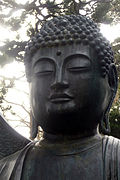Biography
Jan Chozen Bays was born in Chicago, Illinois on August 9, 1945. She grew up in East Greenbush, New York and spent two years in Korea. She received her undergraduate degree at Swarthmore College and earned her medical degree at the University of California at San Diego, specializing in pediatrics. [1]
Bays began practicing Zen in a group that included Charlotte Joko Beck, Anne Seisen Saunders, and Jerry Shishin Wick in San Diego. She eventually moved to the Zen Center of Los Angeles to study with the Japanese Zen teacher Taizan Maezumi Roshi. She had an extramarital affair with him, which she admitted, which devastated his wife and children. She served as the physician at the Zen Center’s community medical clinic. She was a student of Maezumi from 1977 until his death in 1995. She received dharma transmission from him in 1983 becoming his 4th dharma heir and, after Joko Beck, the second woman. [1]
With her husband Laren Hogen Bays, since 1985 she has been a teacher at the Zen Community of Oregon, a Zen center or sangha in Portland, Oregon. [2] Chozen and Hogen Bays are also co-founders and co-abbots of Great Vow Zen Monastery of Clatskanie, Oregon, which opened in 2002. From 1990 until the present she has trained with Shodo Harada, a Rinzai Zen teacher. [3] [4] In 2011, Bays founded Heart of Wisdom Zen Temple in Portland, Oregon. [5]
This page is based on this
Wikipedia article Text is available under the
CC BY-SA 4.0 license; additional terms may apply.
Images, videos and audio are available under their respective licenses.





